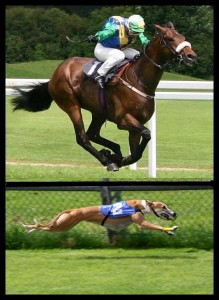This week in Florida major changes began to develop regarding a gambling bill that would slowly cut the use of live animals on racetracks. This will not affect already existing casino table games like blackjack and roulette like the previous version of the bill had targeted.
SB 7088 has been heavily voted on, and this week, on Wednesday April 8th, 2015 the Senate Regulated Industries Committee got to state its opinion on it. Fleming Island’s own Senator Bill Bradley, a Republican and part of the Regulated Industries committee through the Senate, led the talk about the bill.
One important component of SB 7088 is meant to expand the length and reach that blackjack will be offered from the Seminole Tribe casinos in Tallahassee. For the next year, the game will be available in Miami-Dade and Broward counties in order to loosen the hold that the Seminole Tribe has on the game and slot machines.
That hold began back in 2010, where the Seminole Tribe was permitted complete access to games like blackjack throughout the state. In return, the Tribe only had to share about $150 million of the money that it was making from the games, using it to inject money into the Florida economy.
Bradley was outspoken on Wednesday night, stating about the bill amendment: “Right now, there is a distance between the parties and the purpose of me filing the one-year extension bill is the recognition that there is a distance that is not likely to be closed by the end of the season.”
However, the most major component of the bill was that dealing with using live animals like dogs or horses. During the two-hour conversation on Wednesday night, the Senate ultimately decided to approve the bill in a vote of 7-5. Bradley himself actually changed his mind on SB 7088 despite being the one to have created it.
“I would suspect that if we have a gaming bill come out of the Senate, it will probably look a bit different than what you saw come out of this committee today,” Bradley explained of his desire to make changes to SB 7088.
The bill, which doesn’t currently include resort casinos, wants to install more slot machines in casinos throughout the state to reduce the rate of preference for live animal racing. SB 7088 would necessitate that at least 10% of the money made from these slot machine games be used at Tampa Bay Downs. With time, the aim is to end using live animals for a source of gambling entertainment entirely.
Also during Wednesday night’s meeting, Dana Young reintroduced HB 1233 to the crowd. This preexisting bill had been modified. Young’s initial bill was quite lengthy at more than 300 pages, but it has since been trimmed down to a much more reasonable 59 pages. Still, Young’s aim has not changed, which is to also reduce the rate of live animal racing. In HB 1233, the main goal is to disassociate the connection between slot machines, poker games, and animal racing. Rather than using live animals as an incentive to get gamblers to partake in playing poker or some slots, animal racing would be eliminated.
Young is also concerned about the long-term health of horses and other animals that are bred for these live races. Part of HB 1233 insists that all race track owners that use live animals, specifically greyhounds, should have more strict regulations making it tougher for dogs to qualify. This allows animals to get rest rather than allow them to race while injured, something that happens too often to save money on medical expenses.
Senator Maria Sachs, a Democrat in Boca Raton, had already had some success with an amendment to end the use of live animals for racing. By cutting the tax credits that track owners and gamblers receive when betting on animals, there’s less incentive to choose this type of gambling when other forms are more readily available. Sachs was pleased with her progress. “Dog racing has cost the state money so by decoupling it would have a positive impact.”
Besides Sachs’ support, Grey2K USA also champions the cause. Its executive director, Carey Thiel, had spoken out about the mandate. This form of gambling is becoming less and less popular, Thiel noted. “The dog racing mandate is a failed policy. The state is losing and the dogs are losing,” Thiel explained.
He elaborated by bringing up several recent studies that found that up to 196 dogs used in live racing had passed away in the last 20 months alone, totaling up to about one death on a three-day basis. However, the Florida Greyhound Association fought back. The organization cites that the mandate on ending live dog racing would lead to about 3,000 employment cuts. David Bishop spoke out for the organization. “We also believe that the public wants a right to say whether these tracks should be converted into mini casinos,” he stated.
Senator Oscan Braynon, a Democrat of Miami, tried to appease both sides with an amendment that would cut live horse racing as well, explaining: “If we do it for one, we should do it for all.” At this point the Florida Horse Benevolent Protective Association spoke up claiming that a lack of horse racing could kill off the rate of people that breed horses for other reasons as well. Overall, the meeting brought up some interesting and varied points. However, no side seems closer to resolution at this point.
On Thursday, April 9th, Representative Rich Workman, a Republican based out of Melbourne and the House Rules Chairman, will bring about yet another amendment to the House Regulated Industries Committee. While SB 7088 isn’t particularly concerned with destination resort gambling, Workman’s amendment is. He seeks that the county commission or local voters should get a chance to approve of these resorts in Broward and Miami-Dade counties through a referendum.







